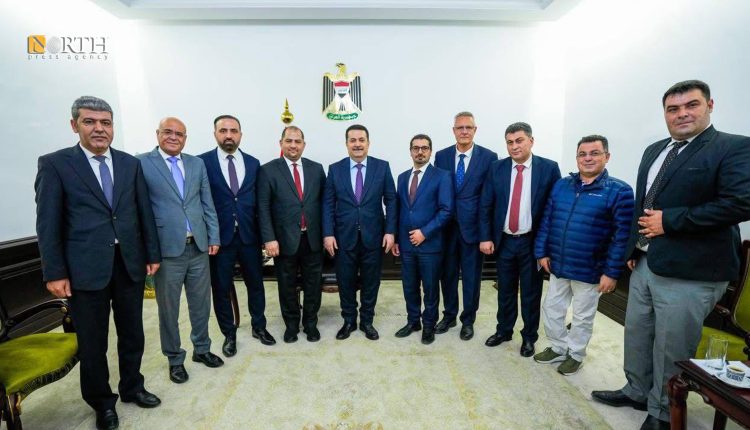
By Hoshang Hassan
QAMISHLI, Syria (North Press) – A delegation of Syrian policy experts and representatives from strategic centers recently visited Baghdad, holding a series of high-level meetings with Iraqi officials and think tanks. The discussions focused on Syria’s political future following the eventual fall of the Assad regime and explored how Iraq’s post-2003 transition could inform Syria’s next chapter.
High-level meetings and shared concerns
The delegation met with key figures including Iraqi Prime Minister Mohammed Shia’ al-Sudani, al-Hikma Movement leader Ammar al-Hakim, Speaker of Parliament Mohammed al-Mashhadani, Cardinal Louis Sako, head of the Chaldean Catholic Church, as well as senior security officials such as National Intelligence Service Chief Hamid al-Shatri and National Security Advisor Qasim al-Araji.
Abdel Ilah Mustafa, director of the al-Furat Center for Studies and a member of the delegation, said the talks addressed a range of political, security, and economic developments affecting Iraq-Syria relations. The meetings also examined the influence of regional players—Turkey, Jordan, Lebanon, Egypt, and the Gulf states—on Syria’s transition process.
Mustafa noted that the Iraqi experience was viewed as a relevant reference, especially given similarities in cultural, ethnic, and religious diversity, as well as the federal structure Iraq has adopted—one of the few such models in the Middle East.
Iraqi fears and transition priorities
Hozan Ibrahim, Executive Director of IMPACT (a civil society research and development), said Iraqi officials expressed concern over the possible inclusion of Iraqi nationals in decision-making structures within a future Syrian administration, warning that the presence of foreign fighters could pose “a major threat and potential coup project.”
One of Baghdad’s primary concerns is the issue of thousands of Iraqi families still living in Syria’s Hawl Camp, many with ties to ISIS. Ibrahim said Iraq has repatriated thousands of these individuals, though around 14,000 remain. Several hundred suspected militants have been transferred to Iraqi prisons for prosecution.
Ammar Kahf, Executive Director of the Omran Center for Strategic Studies, highlighted Baghdad’s anxiety over potential security spillovers from Syria. He emphasized Iraq’s efforts to prevent militia infiltration across the border and expressed fears of a sectarian escalation in Syria triggering unrest inside Iraq.
Iraqi officials also voiced concern that emerging Syrian leadership may not reflect the country’s social and sectarian diversity. Ibrahim noted that Shiite leaders in Iraq are particularly uneasy about the future of Syria’s Alawite community, fearing that attacks or marginalization could provoke anger among Iraq’s Shiite population and repeat past mistakes of sectarian exclusion.
Counterterrorism and ISIS threat
Iraqi officials also raised the issue of the ongoing threat from ISIS and the security risks posed by prison breaks. Kahf stated that Iraq is highly concerned about the potential escape of foreign fighters, which could reignite terrorist activity in the region.
Mustafa reaffirmed the importance of the Syrian Democratic Forces (SDF) in the fight against ISIS, calling them “genuine partners” in counterterrorism efforts. He added that Iraqi representatives expressed a strong interest in opening a new chapter of cooperation with Damascus based on mutual interests and good neighborly relations. Proposals included reactivating the Iraq-Syria protocol and resuming the operation of cross-border oil pipelines.
Lessons from Iraq’s transition
Ibrahim explained that Iraqi officials offered a candid reflection on their own post-2003 experience, particularly the high costs of dismantling state and military institutions through the de-Baathification policy. He said Iraqis stressed that this decision left a vacuum exploited by terrorist groups like al-Qaeda, and that Sunni exclusion early in the transition led to long-term political imbalances.
According to Ibrahim, Iraqi leaders identified several key elements that helped preserve the state post-Saddam Hussein: the presence of U.S. forces as a security guarantor, the moral authority of the Shiite religious leadership under Ayatollah Sistani, and sufficient oil revenues to fund reconstruction. They also highlighted the importance of parliamentary governance, federalism, and balanced representation of all communities.
Recommendations for Syria’s transition
The Iraqi side shared several recommendations with the Syrian delegation for managing a future transition:
• Adopt a parliamentary or mixed political system allowing for broad participation of all communities.
• Emphasize national identity within a civil state that respects minority rights.
• Implement decentralization while preserving sovereign responsibilities for the central government.
• Recognize the unique characteristics of northeastern Syria and build upon local governance successes.
• Avoid dismantling the army or state institutions, instead holding specific individuals accountable through legal means.
• Complete the drafting of a new constitution within two years.
• Prioritize economic development and fair wealth distribution.
Iraqi officials also expressed willingness to support Syria’s transitional phase while respecting the will of the Syrian people and avoiding interference in their political choices. They suggested leveraging the intertwined demographics and political interests of both nations to promote regional stability and cooperation.
